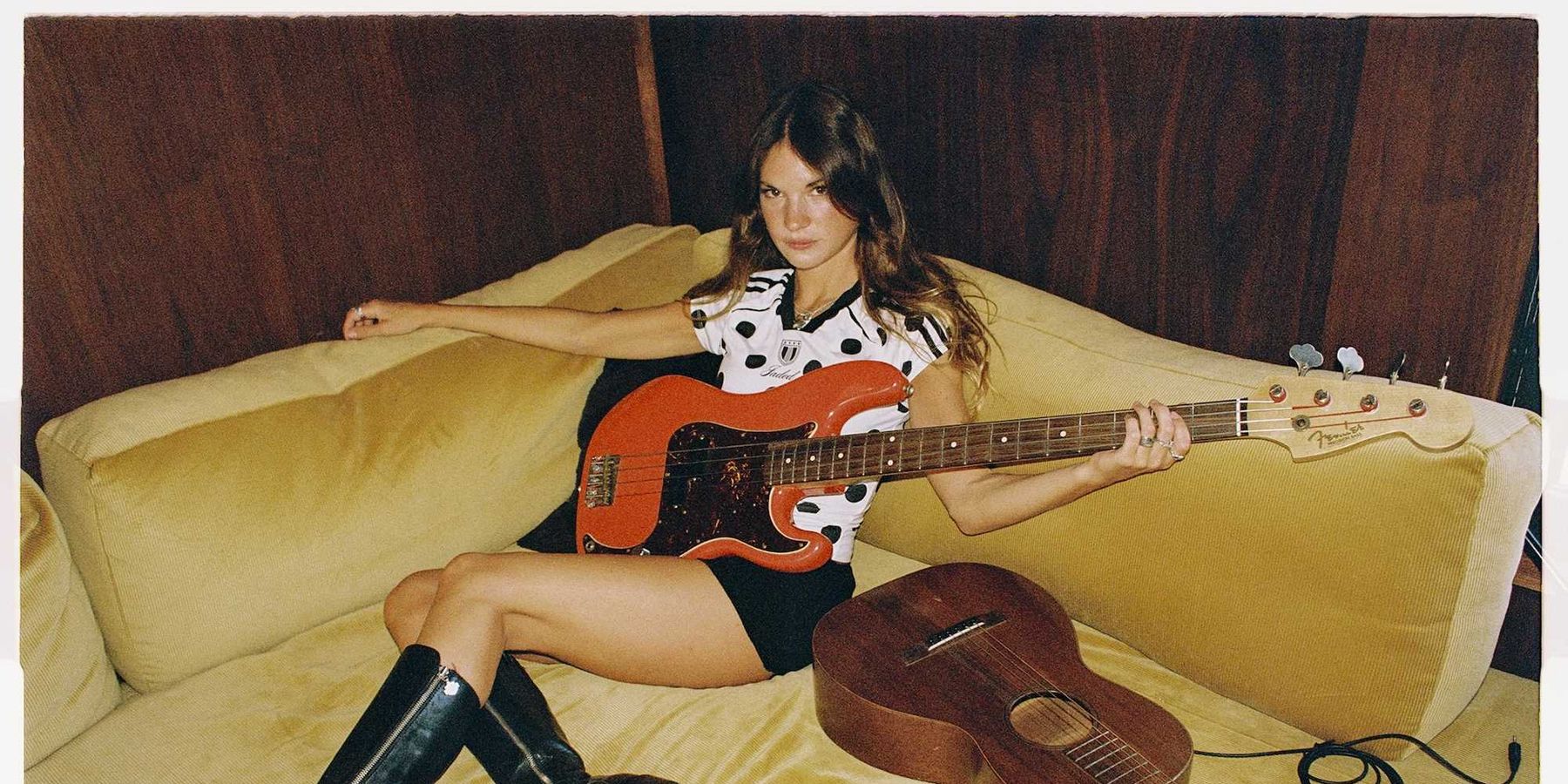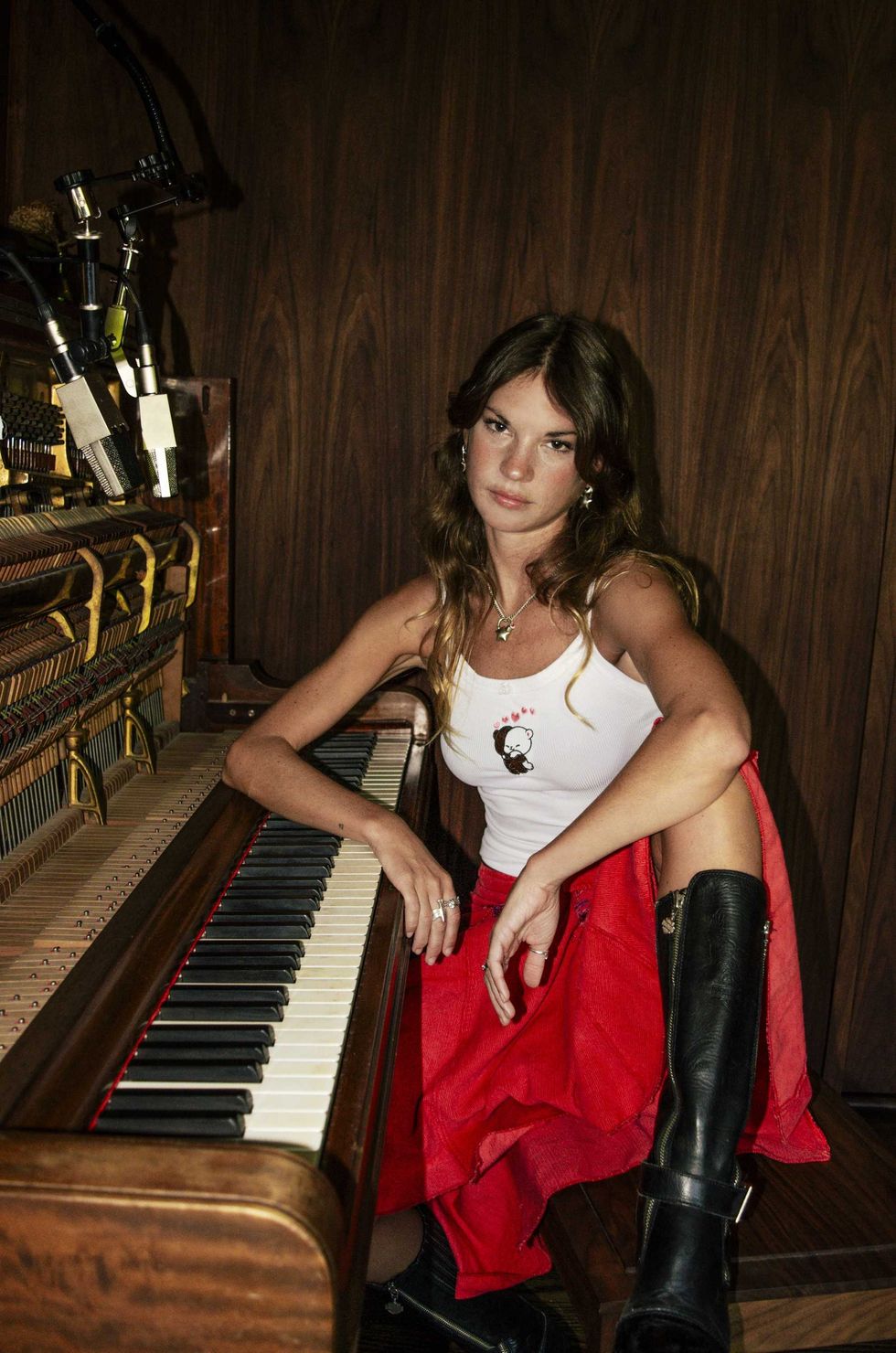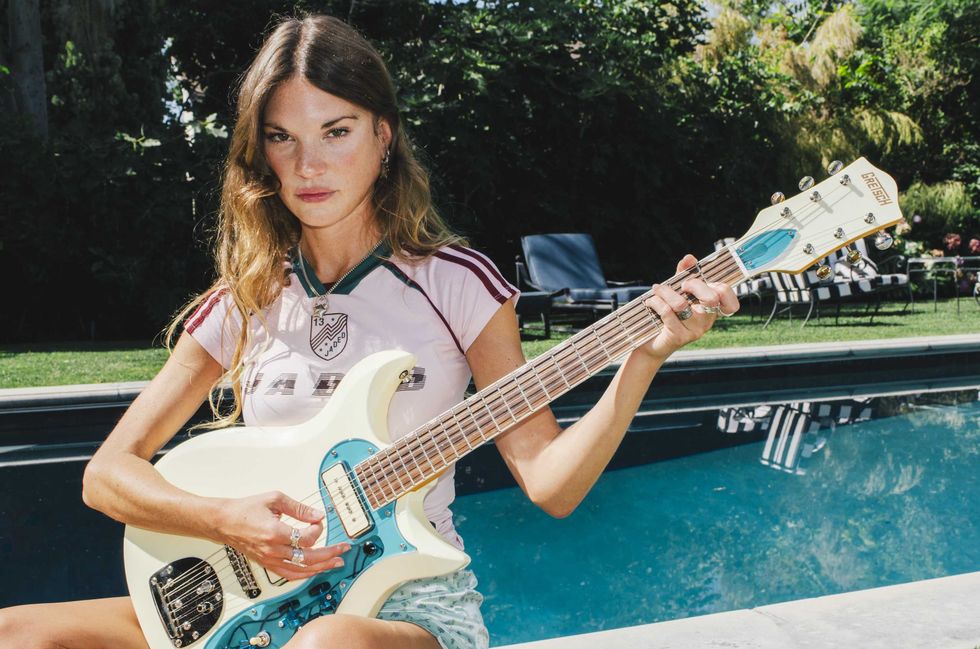
Amy Allen Sticks to the Classics
BY
Tobias Hess | Oct 07, 2025

Whether it’s the clipped poetics of “Espresso,” the meandering narration of “Please Please Please,” or even the anthemic simplicity of “APT,” any song that Amy Allen has worked on has a certain quality.
Timelessness could be the word, an essence that derives from Allen’s ongoing commitment to the fundamentals of songwriting. Or maybe another word is “rooted,” an adjective she frequently invokes in our conversation. Calling in from her sunny home in Venice, she describes her writerly sensibilities as being grounded in the Tom Petty, Dolly Parton and John Prine she’d listen to in long car rides in rural Maine, where she grew up. While her brain has surely been filled with the fizz of contemporary pop since then, it’s those classics that lend her songs a fundamental clarity that is relatively rare in the 2025 pop machine, where art is so often made via committee and informed by algorithms.
Allen, who last year became the first woman to win Songwriter of the Year, is calm in our conversation, even as she’s had what is undoubtedly one of the busiest past few years in music. She’s written with the likes of Halsey, Justin Bieber and Harry Styles, but it’s her close collaboration with Sabrina Carpenter that transformed Allen from a reliable lyrical athlete into a clear MVP of the industry. She co-wrote those previously mentioned hits by Carpenter, alongside the rest of the 12 songs on the singer's landmark album, Short N’ Sweet.
That close collaboration continued on Carpenter’s notably quick follow-up, Man’s Best Friend, with Allen co-writing all of the album's songs. “The really fun part about working with Sabrina is that it really does feel like girls just sitting, laughing and writing in their diaries. When we are in that world of creating, it feels so free, curious and open,” Allen says. “There's really no moment that feels scary with her because she's so fearless.”
The (Grammy) jury is still out on whether she'll receive another nomination for Songwriter of the Year in the coming months. But regardless of the outcome, the world will still be hearing Allen’s words for many years (and decades) to come.
PAPER spoke with the prolific songwriter and artist about growing up in Maine, maintaining the creative spark, and her close ongoing collaboration with Carpenter.
What's always drawn me to music is this feeling that I'm grounded and rooted in an emotion.
You're from Maine, right? I recently did a long profile of Role Model and —
I took prom pictures on his lawn! How crazy is that?
No way.
My high school boyfriend was really good friends with his older sister. Isn't that so weird? I love Tucker [Role Model]. He is phenomenal.
We talked a lot about being from Maine and how that shaped his artistry, how the transition to LA was a particular culture shock for him, because it’s so opposite in so many ways. Was that your experience as well?
It was for sure. I didn't have a ton of friends out [in Los Angeles] when I first moved here, and the few friends I did make worked in music. It just felt like everything you talked about was music, everything social gathering you went to revolved around music. I first moved to West Hollywood, which is like, so, so industry-centric. Two and a half years in, I moved to Venice, where I live now, and everything changed for me because none of my friends in Venice work in music, and I'm right by the beach, which is how I grew up in Maine. I can walk to everything. I kind of forget that I live in such a major city. I go in every day for sessions to different places, but I feel like I've found my area here, so it's much more doable for me.
I'm from LA for context and a lot of my friends work in music. Part of why I wanted to get away was because everything can feel so industry there. Your writing feels very timeless and removed from that. I'm curious about how you created that space or stay on your own frequency.
I grew up in rural Maine in Wyndham, which is on Tobago Lake. When I was in high school, my parents moved to the ocean, close to the same town where Tucker is from.I had to do such long drives when I was younger. My dad would always play a lot of timeless music that I really associated with being outdoors, like Tom Petty, Dolly Parton, John Prine, and Fleetwood Mac. It was Americana country and folk. It just felt very grounded and earthy to me, and I think especially when I moved to LA, it felt like the opposite of that and the opposite of me in a lot of ways. What's always drawn me to music is this feeling that I'm grounded and rooted in an emotion, or close to home and the people that I love.
Going back to those records has helped me immensely through significant life changes, such as attending college for music or moving to the West and signing a publishing deal. It's helped me keep my world feeling a lot smaller than this big, scary, massive music world that I could easily get lost in. I just continue to come back to the core of what I loved about music and the artists that I loved. That informed a lot of my writing instincts as well.
Early on in your writing career, did you feel like you had to sacrifice those instincts?
Every writer I know experiences a dark age — a few months, or maybe even a year, or a couple of years — where you look back on it and are like, “Whoa, I was caught up in trying to write what I thought would be the next thing, or I was way too informed by what's on pop radio.” It's easy to feel like you’re on this constantly moving hamster wheel sometimes, and you wanna keep up with it. I had this [come to Jesus] moment where I remembered the thing that I loved about music was feeling really grounded and rooted in an emotion and a feeling within my body. That instantly goes away when I'm trying to chase something that's a trend or something that's happening right now on the radio. If I lose sight of that, then the songs that I end up making consequently don't feel real and therefore they don't connect with people. During COVID, I started to hone back into what made me fall in love with music. [I asked,] Who are the artists that made me fall in love with music, and why did those songs connect with me in such a way? I tried to get my writing back to feeling really grounded within myself and my surroundings. Being in nature and going home more has helped me a lot.
Is there a certain song or particular artist who you think allowed you to merge your own taste and sensibility with more commercial expectations?
One of the first times I had a big moment where what I love to write in my own time is also something that this artist loves to write was a song I did with Harry [Styles] called “Matilda.” I'd done a song with Harry before called “Adore You,” which was so fun. It was one of my first up-tempo songs that I ever had that came out on the radio. Everything else I had [on the radio] had been mid-tempo and really emotional. “Adore You” helped me realize I can be a part of something fun, that people like to dance to, that feels lighter, but still feels like me. And then with “Matilda” … it was so emotional to me and so honest to him and to so many people. I think of all the songs I've been a part of, that's one where people reach out to me to tell me that it struck a chord in them in a really serious way. I'm so grateful that that song is in the world. It was a moment where I was like, “Okay, I don't have to chase any trends. What I love and what feels true to me is what a lot of people love and feels true to them.” As long as it's a real emotional sentiment that I'm following, it can reach a lot of people, and I'm so grateful for artists like Harry who are willing to go there and be vulnerable and make that music.
Pop songwriting is an art and a science. I'm curious how much you think about the math of a pop hit?
Not at all. I don't know much theory at all. In terms of math, I can tell there are certain tricks that songwriters pick up along the way. When you listen to a Max Martin song, there are a lot of strategic moves that are happening so that the chorus feels massive. Every part to it feels like a building block that's moving up the ladder to the big climax. I’m not really a music-mathy gal, but I do know that when I'm writing a pre-chorus or verse, I don't want the notes that I'm hitting in the pre-chorus or the verses to be walking all over the note that the chorus is going to hit. Then the chorus just doesn't feel as euphoric. Or if there's a certain line in the chorus that I really want to stand out … maybe don't want to be reiterating that same thought throughout the verse. You don't want to give too much away.
There are definitely bits that I am very conscious of, but I'm not technically mathy, and it's actually really fun because there's a lot of accounts now that are pretty mathy that will be like, "Oh my God, ‘Without Me’ or ‘Please Please Please,' or 'Espresso,'" did all these things that weren’t necessarily super thought about in the process. A lot of my favorite songwriters just go off of emotion. My favorite artists are the exact same way. They're really governed by how it feels in their body. I've always been that way, so that's where I stand on that. But I'm always in awe of people that are very mathy about music and can make a song that’s technically perfect.
So with something like “Espresso,” which people would say is the perfect, earworm pop, that arrived intuitively in the same way that something longer like “Please Please Please” came about?
It's only the same process in the sense of I trust Sabrina [Carpenter] with my whole heart, soul and guts. She is such a phenomenal songwriter and artist, and I know she trusts me as well as a collaborator. When something feels good, we allow that to take the reins and we can run with it. There are very few people in the world who I'm like, “Let's go,” and we just start moving, and it snowballs into something that we're all really excited about in the room. That takes a lot of trust and rapport to have with somebody to get to that point where you can allow something to come so naturally and it doesn't have to be this robotic thing. It feels very natural.
“Espresso” and “Please Please Please” came together in very different ways, but both were so exciting. They're such different songs, and to get to work with an artist that can put out “Espresso” and live in that world and then do the same with another song like “Please Please Please,” which is very different … I don't know any artist that could live under both of those umbrellas and sell them both so seamlessly and phenomenally. I feel blessed to be able to work with somebody that can do that.
One of the most remarkable things about Sabrina is the sense of humor that comes out on these two records that you worked on. Is that your sense of humor as well, or are you tapping into Sabrina's?
One of the most exciting things for me as a songwriter is getting to learn more about myself with every single artist that I work with — whether it's Sabrina or somebody else. Sabrina is so funny, witty, quick, smart, and so musical, just being within her orbit brings out parts of me that I didn't even know existed or wasn't necessarily brave enough to follow. She is this amazing artist that can encompass light and funny moments, and also immensely vulnerable, serious and heartbreaking moments, and have them all wrapped up in one. Of course, it's a collaboration. She is fully the engine and I just feel grateful to be around it for sure.
As long as it's a real emotional sentiment that I'm following, it can reach a lot of people.

The raunchiness on this last project in particular is super remarkable. There's such a high ratio of jokes to lines. Was there a line that made you cringe a little bit?
The really fun part about Sabrina, and getting to work with her is that it really does feel like girls just sitting, laughing and writing in their diaries. When we are in that world of creating, it feels so free, curious and open. There are really no moments that feel scary with her because she's so fearless. She's so secure in herself and she shamelessly will go after what she loves and what she wants. If an artist is constantly doubting themselves, it makes it much easier as a songwriter to have those [doubting] moments [too]. But when you get to work with somebody like Sabrina, who's so steadfast in what she wants and what she loves and what her voice is, it's so fun to go on that road with her. It just feels like every single door is open to you to walk down, whether it's moving into a country genre or moving into an R&B genre, or whether it's being very pop and shameless about it, funny or very vulnerable: every door is bust wide open with her, and I think that is remarkable.
Working with so many artists and having been so prolific, do you have a certain method for maintaining the creative spark, or do you ever experience burnout?
Two years ago, it really clicked in my brain that you need to live a life to be able to write about a life. I've been a lot better at taking time away from writing the past two years. I'm still consuming a ton of music. It feels like much more an input period than a constant output period and finding the ebb and flow of that. Every writer I know has different ways that they can move through it. I'm friends with some people that write twice a week. I'm friends with some people that write six days a week and do doubles a lot of those six days … all of us have different output thresholds. Finding mine has taken me a really long time. It's ever-changing. Right now, I’m so inspired by the artists that I'm getting to work with because I'm getting to work on R&B. I'm getting to work with some of my favorite country artists. I'm getting to work with some of my best friends in the pop space. I just feel so inspired by them. I am now in a place in my career where I can take more days off and allow myself to take music in and to go be in nature and be around my family and my friends. That always refuels the tank.
The Rosé and Bruno Mars song, “APT,” is so fun. I'm curious about that one and where it sat in your world. It feels quite different.
That was such a good learning experience for me. A lot of the music that I was raised on or was working on as a songwriter coming into the industry made me think that every song had to feel like my heart was breaking and I had to sit for hours and think through each lyric over and over. One of the songwriters that day was my friend Theron [Thomas] and Rosé was teaching us this drinking game. The second he heard us playing it, he was like, “That has to be what we write about today.” That was such a good learning experience for me; than an amazing song can come from anywhere. It does not have to always come from somebody walking in the room being like, “I cried my eyes out for eight hours last night.” It can be a cultural drinking game that is hooky, that is then turned into this worldwide music [moment]. There is the saying, “Music is a universal language.” That [song] was the first time in my career that I was like, “Oh, I get the meaning of that.” The entire world is singing these lyrics. A lot of people probably don’t know what they mean, but somehow it is having this worldwide effect. It’s so amazing for Rosé to put her culture in this beautiful spotlight and share this Korean moment with the whole world. And I've obviously been a fan of Bruno for most of my life at this point. It was really special to get to be a part of a song where there were just so many cultures blending and we got to make something so unique and exciting. An amazing song can come from anywhere, and that day was really special.
Photography: Caity Krone